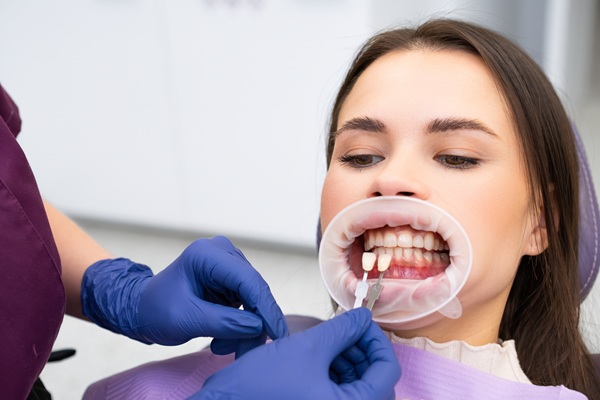When Your General Dentist May Recommend a Deep Dental Cleaning

Visits to your general dentist are done routinely, which for most people is twice per year or every six months. Sometimes, your dentist may recommend a deep dental cleaning. What is that? In this article, we will review what a dental cleaning is and when you might be due for one.
What is a deep dental cleaning?
Just like spring cleaning in your home, your teeth sometimes need a deep clean as well. Dental deep cleans are those that clean between the teeth and gums, all the way down to the roots. They also may be called gum therapy, but it refers to the same treatment.
Why would I need a deep dental cleaning?
Your general dentist may recommend a deep dental cleaning for a couple of different reasons. You may need a deep cleaning if you are experiencing symptoms of periodontal diseases, such as:
- Red, tender, and/or bleeding gums
- Loose teeth
- Bad breath
- Gum recession
These symptoms may indicate gingivitis or periodontal disease, which, if left untreated, may put you at risk of losing teeth and bone. Plaque is the combination of leftover food and saliva, which make a sticky substance coating the teeth. Tartar is the hardened form of plaque and is composed of bacteria, proteins, and saliva.
The buildup of the two, which can develop from a lack of brushing or improper brushing, can cause your gums to become inflamed.
The inflammation causes the gums to pull away from your teeth, which becomes more of a problem because it allows the plaque to move below the gum line, where you are unable to reach with your toothbrush.
In your general dental visits, your dentist or dental hygienist will examine your teeth and gums to check for pocketing, which are gaps between the teeth mentioned above. If those pockets exceed a depth of five millimeters or more, you may need deep cleaning done.
How can a deep dental cleaning help?
Deep dental cleanings consist of two parts, both of which help remove the buildup of plaque and tartar. The first phase is scaling, which removes the buildup congregated under the gumline. Root planing, the second phase, smoothens the root of the tooth so the gums can adhere to the tooth again.
The process can be painful, so the patient is usually dosed with a local anesthetic. At many general dentist’s offices, the treatment procedure is split into two visits, each of which will target one-half of the mouth.
What can you do to avoid needing a deep dental cleaning?
Prevention of gingivitis and periodontal disease starts at home. Since both of these conditions are preventable for the majority of people, maintaining healthy brushing and flossing habits should help keep you from needing a deep clean.
Brushing twice a day and flossing once a day is recommended to eliminate the buildup of unwanted plaque and tartar. Keeping your pearly whites clean will help you avoid the dreaded recommendation from your dentist for deep cleaning.
Request an appointment here: https://smileydentalmaricopa.com or call Smiley Dental at (520) 252-4044 for an appointment in our Maricopa office.
Check out what others are saying about our dental services on Yelp: General Dentist in Maricopa, AZ.
Related Posts
General dentists provide essential care to support oral health at every age, including well into adulthood and throughout the golden years. The goal is to help keep the smile in good shape so that it stays healthy, comfortable, and functional. Dental professionals can also address age-related oral health concerns, keeping you on track for a…
Our general dentist recommends brushing with a toothpaste that contains fluoride to give your teeth the highest level of protection possible against tooth decay. Fluoride is a naturally occurring chemical that helps to re-mineralize and strengthen teeth enamel.Fluoride can be found in natural bodies of water, as well as many fruits and vegetables like grapes…
General dentistry is about more than keeping your teeth looking good. Oral health has a strong connection to your overall health, both affecting each other in turn because your mouth connects the outside environment to the inside of your body. As a result, practicing oral hygiene — or failing to do so — is a…
Going to the dental office regularly likely means that the teeth will be cleaned on a routine basis, however, this does not mean that a deep teeth cleaning will be done. A deep teeth cleaning is actually different than the routine one that is done at a check-up. Many patients initially believe that a deep…


